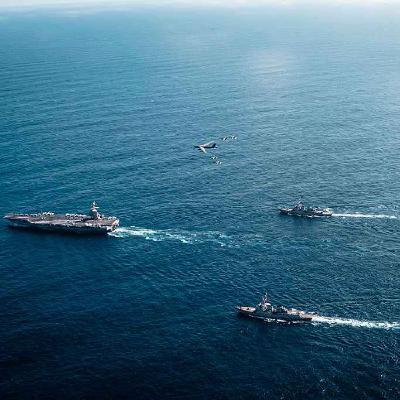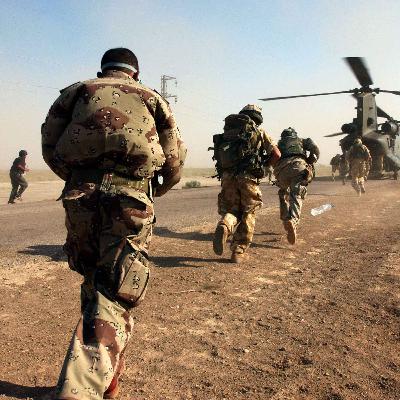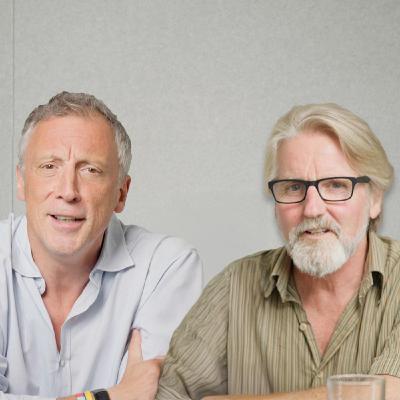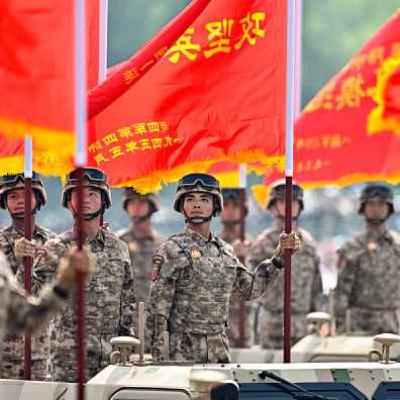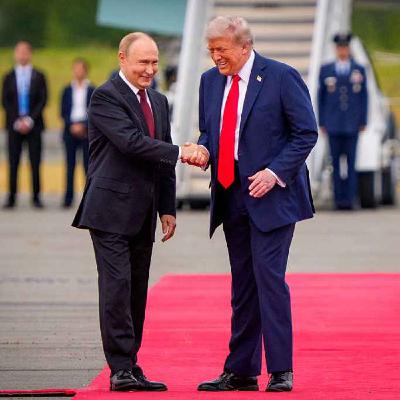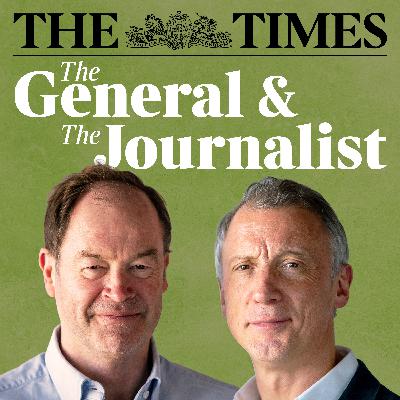Discover The General & the Journalist
The General & the Journalist

The General & the Journalist
Author: The Times
Subscribed: 1,037Played: 6,736Subscribe
Share
© The Times
Description
How wars start, how they are won and what they leave behind them.
General Sir Patrick Sanders and Tom Newton Dunn first met in a war zone. Drawing on their real-life experience of armed conflict, they bring you the latest from Ukraine, Gaza and the dozens of other bitter struggles being fought across our increasingly divided planet.
From interviews with key people on the frontlines of modern warfare to discussing the future of nuclear weapons and where Russia will attack next, this podcast from The Times and The Sunday Times also faces up to the biggest question - how ready are we for war, right now, if we had to fight one?
Hosted on Acast. See acast.com/privacy for more information.
32 Episodes
Reverse
Europe is rearming at a pace not seen in decades, from the Baltics to France, where President Macron has called for a new era of “mobilisation,” short of conscription but aimed at readying the nation for darker horizons. This week, Tom and Patrick ask what the UK should do in response, and whether our volunteer army can meet the moment. They’re joined by Oliver Moody, The Times’s Berlin correspondent and author of Baltic: The Future of Europe, to explore how frontline states are preparing their populations for potential conflict. From Finland’s “Total Defence” model to France’s new voluntary service for teenagers, they break down the shifts already underway, and the uncomfortable questions they raise for Britain. Vote for The General & the Journalist for People's Choice at the 2026 Political Podcast Awards.Hosts: Tom Newton Dunn & General Sir Patrick SandersGuest: Oliver MoodyClip: EuronewsPhoto: Getty ImagesGet in touch: generalandjournalist@thetimes.co.uk Hosted on Acast. See acast.com/privacy for more information.
Cyber warfare is played out in the shadows, never declared and never attributed. But, as the General in charge of Nato's cyber operations tells Tom, the west is fighting what amounts to a war on a daily basis. Patrick agrees, recalling his time as Commander of UK Cyber operations, an experience he likens to living under a 'digital Blitz.' Host: General Sir Patrick Sanders & Tom Newton DunnGuest: Turkish Brigadier General Ümit ErsoyPhoto: NATO Get in touch: generalandjournalist@thetimes.co.uk Hosted on Acast. See acast.com/privacy for more information.
The largest deployment of US naval assets since the Cold War has been sent steaming across the Atlantic to the Venezuelan coast. The CIA has reportedly been given the green light to operate inside the country. And now the Cartel de los Soles has been designated a Foreign Terrorist Organisation, potentially paving the way for strikes against the man the US claims to be its leader, President Nicolas Maduro himself. But what really sits behind Trump's determination to see him off, and how might he do it?Host: General Sir Patrick Sanders & Tom Newton DunnGuest: Ryan BergClips: Associated Press, The Sun, PBS News HourPhoto: Getty ImagesGet in touch: generalandjournalist@thetimes.co.uk Hosted on Acast. See acast.com/privacy for more information.
The former chief of MI6, Sir Alex Younger, tells Tom that this is the moment Europe needs to “regain its relationship with hard power”, having been caught on the back foot by an American peace plan widely regarded to have been made in Moscow. As we recorded this bonus episode, Ukraine had just accepted America's modified plan, but Moscow had yet to respond. Sir Alex believes that “Ukraine is still in the game.” But for how long? Guest: Sir Alex YoungerHost: Tom Newton DunnPicture: Getty Hosted on Acast. See acast.com/privacy for more information.
Journalist Annie Jacobsen joins Tom to discuss her bestselling and harrowing book Nuclear War: A Scenario, which maps out in minute-by-minute detail what would happen if a single nuclear missile were launched at the United States. Drawing on rare on-the-record interviews with senior nuclear experts, she reveals how little time a president has to respond, how unreliable missile defenses truly are, and why even a lone strike could trigger global annihilation. Tom and Annie explore the catastrophic aftermath and the grim reality that no nation, however distant, would be spared. With nuclear tensions rising and key treaties expiring, the episode confronts an urgent question: whether nuclear war is becoming inevitable, and what humanity can still do to prevent it.Host: Tom Newton DunnGuest: Annie JacobsenPhoto: Getty ImagesGet in touch: generalandjournalist@thetimes.co.ukFurther listening: A new age of nuclear weapons Hosted on Acast. See acast.com/privacy for more information.
It's warfare or lawfare, but it can't be both. Patrick and Tom chat with General Sir Nick Parker, Patrick's friend and mentor of old, to talk about a letter they and six other four-star Generals signed, calling for an immediate end to retrospective legal cases being brought against former servicemen and women.The cases are not only undermining the very basis of the compact between soldier and state, but it's also jeopardising operations in the field, a fact Patrick and Nick confirm when they discuss the departure of a "significant" number of Special Forces officers who've handed in their weapons rather than risk being dragged before the courts on some as yet unknown charge.Hosts: Tom Newton Dunn & General Sir Patrick SandersGuest: General Sir Nick ParkerPhoto: Getty ImagesGet in touch: generalandjournalist@thetimes.co.ukFurther reading: "Ongoing lawfare risks everything" Hosted on Acast. See acast.com/privacy for more information.
In the space of only three days, President Putin announced the arrival of two new super weapons. Both powered by nuclear reactors, they have no equal in the west. Burevestnik, or Skyfall by its Nato codename, is a low-flying cruise missile with unlimited range and the ability to travel undetected by US defence systems. Poseidon is a torpedo capable of carrying a nuclear payload which, if detonated, could inundate entire US coastal cities with a radioactive tsunami. In response, President Trump called for the immediate resumption of nuclear warhead testing after a three-decade moratorium. Tom and Patrick discuss whether Skyfall and Poseidon actually work or could ever be usefully deployed. But despite the doubts, they agree their arrival poses a serious threat to nuclear arms reduction. And, while the US may take some comfort from the potential limitations of Skyfall and Poseidon, both Russia and China have pulled ahead where it matters most, hypersonic warfare. Tom and Patrick explain how the west got left behind and why it urgently needs to catch up.Hosts: Tom Newton Dunn & General Sir Patrick SandersPhoto: Getty ImagesClips: 60 MinutesGet in touch: generalandjournalist@thetimes.co.ukFurther listening: China's power: The PLA vs the USA Hosted on Acast. See acast.com/privacy for more information.
For three and a half years, BBC correspondent James Waterhouse was the face of the Ukraine war, reporting nightly from Kyiv through air raids, blackouts, and breaking news. In this episode, he joins Tom and Patrick to reflect on the mental and emotional toll of years on the frontline, the strange adjustment to life back home, and the addictive intensity of war. From the first hours of Russia’s full-scale invasion to the blurred battle lines of today, he offers a rare insider’s view of a conflict that continues to redefine modern combat. A gripping conversation about technology, trauma, and the personal cost of telling one of the world’s hardest stories.Guest: James WaterhouseHosts: Tom Newton Dunn & General Sir Patrick SandersPhoto: Courtesy of James WaterhouseClips: BBCGet in touch: generalandjournalist@thetimes.co.ukFurther listening: "Whose wars do we care about and why, with war reporter Anthony Loyd" Hosted on Acast. See acast.com/privacy for more information.
While trade wars hog the headlines ahead of next week's historic meeting between Donald Trump and Xi Jinping, it's the potential of a real, kinetic war over Taiwan that's occupying the minds of military analysts the world over. Xi has called the reunification of Taiwan and China 'inevitable' and necessary for the realisation of his 'China Dream.' But America has a historic obligation to come to Taiwan's aid if it were attacked militarily. So what would happen if an unstoppable force were to meet an immovable object, some say as soon as 2027? Who would win, and how would it play out? Dr. Oriana Skylar Mastro is one of the west's leading analysts of China and author of Upstart: How China Became a Great Power. She also advises the Pentagon, though she's talking to Tom and Patrick in a personal capacity. Further listening: China’s power: The PLA vs the USA (Part 1)China’s power: How Xi is running rings around the West (Part 2)Host: Tom Newton Dunn & General Sir Patrick SandersGuest: Oriana Skylar MastroPhoto: Getty ImagesClips: ReutersGet in touch: generalandjournalist@thetimes.co.uk Hosted on Acast. See acast.com/privacy for more information.
While Nato looks up at the skies to Russian drones buzzing its airspace, a far more serious threat lurks below, on our ocean beds. And evidence is mounting that Moscow is already mapping the frontlines in a putative, deniable, attack. As our guest, the former British Defence Secretary, John Hutton, tells Tom, undersea cables are the means by which the economy and society itself survives. And they are vulnerable to sabotage in the form of 'accidental' cutting by shadow-shipping vessels. This could, at a stroke, kill the UK's sources of data, disabling banking, business, communications, and even the UK's 'ability to defend itself.' John Hutton is now a member of the House of Lords and sits on the National Security Strategy committee. Last month, it published a report into the potentially 'catastrophic' consequences of just such an attack and laid bare the UK's lack of preparedness. As John tells us, this would be a 'world of utter chaos, where civil order hangs by a thread.' And hoping for the best, while failing to plan for the worst, would be an absolute derogation of duty on the part of the Government. Host: Tom Newton Dunn Guest: John HuttonPhoto: Getty ImagesClips: DW News, 60 Minutes, CBC NewsGet in touch: generalandjournalist@thetimes.co.ukFurther reading: Joint Committee on National Security Strategy Report: “Subsea telecommunications cables: resilience and crisis preparedness” Hosted on Acast. See acast.com/privacy for more information.
As President Trump orders the Texas National Guard into Chicago, America stands poised on the brink of a constitutional crisis. With troops already stationed in Los Angeles and Washington, D.C., critics charge that the president is wielding the military as a political weapon. At the same time, Trump is reshaping the upper ranks of the armed forces, sidelining those who have challenged his authority. Authoritarianism and democracy look more finely balanced than at any time in living memory. So, how far does presidential power truly extend when it comes to deploying soldiers on home soil? And to whom do America’s generals ultimately answer? Hosts: Tom Newton Dunn & General Sir Patrick SandersPhoto: Getty ImagesClips: 10 News, BBC, The New York Times, AP, CBS News, The White House, MSNBC Get in touch: generalandjournalist@thetimes.co.uk Hosted on Acast. See acast.com/privacy for more information.
A wave of drones targeting airports, threatening critical infrastructure and potentially endangering the lives of civilians brought a number of Nato countries briefly to a standstill this past month. The presumed gift of President Putin, this deniable activity was straight out of the Kremlin playbook. But was the primary purpose to disrupt for disruption's sake, to probe the weaknesses in Nato's defensive lines or - ultimately - to sow the seeds of a split within the Alliance? As Nato ponders its response, Tom and Patrick explain the 'vertical' and 'horizontal' options available to it, debate whether the West should deter or punish Russia, and ask whether we are now effectively at war?Hosts: Tom Newton Dunn & General Sir Patrick SandersPhoto: Getty ImagesClips: Sky NewsGet in touch: generalandjournalist@thetimes.co.uk Hosted on Acast. See acast.com/privacy for more information.
This week, Patrick and Tom turn their attention to India - the world’s most populous country, a rising military power, and a state determined to hold its ground between East and West. As President Xi Jinping courts Prime Minister Narendra Modi and Washington’s ties with Delhi fray, India’s long-cherished “strategic autonomy” is looking increasingly fragile. With Britain’s Prime Minister preparing a visit and global rivalries intensifying, which way might India lean, and what are the stakes here for the West? To explore these questions, Patrick and Tom are joined by a uniquely placed guest: General Manoj Naravane, India’s former Chief of the Army Staff.Guest: General Manoj NaravaneHosts: Tom Newton Dunn & General Sir Patrick SandersPhoto: Getty ImagesGet in touch: generalandjournalist@thetimes.co.uk Hosted on Acast. See acast.com/privacy for more information.
This week Tom is joined by award-winning war correspondent Anthony Loyd for a special “Journalist & Journalist” edition. Together, they explore why some wars capture global attention while others, equally devastating, remain largely ignored. Drawing on three decades of frontline reporting from the Balkans to Afghanistan, Iraq, and Ukraine, Anthony offers a unique insight into how compassion fatigue, geopolitics, history, and media dynamics shape public awareness. The conversation contrasts Russia's invasion of Ukraine with Sudan’s overlooked civil war. Anthony also reflects on the personal toll of covering forgotten wars, and what it means to keep telling these stories, even when the world isn’t listening.Recorded August 2025.Guest: Anthony LoydHost: Tom Newton DunnGet in touch: generalandjournalist@thetimes.co.uk Hosted on Acast. See acast.com/privacy for more information.
This week, Patrick and Tom turn from China’s military power to its less visible, but no less powerful, tools of economic dominance. Their guest, Sam Olsen is a geopolitical strategist with decades of experience studying China who argues that the West’s reliance on Chinese supply chains isn’t just about cheap consumer goods, but runs through the very heart of our defence industries. From rare earth minerals to advanced technology, China has a stranglehold over the components needed to build the weapons of the future. The result is a stark assessment: the real question may not be whether the West could beat China in a war, but whether it could fight one at all.Guest: Sam OlsenHosts: Tom Newton Dunn & General Sir Patrick SandersPhoto: Getty ImagesGet in touch: generalandjournalist@thetimes.co.uk Hosted on Acast. See acast.com/privacy for more information.
The People’s Liberation Army put on one of the largest military displays in China’s modern history this week as the country marked the 80th anniversary of Japan’s surrender in the Second World War. Accompanied by Presidents Putin and Kim Jong Un, President Xi Jinping showed the world the might of the CCP’s forces, but China-watchers disagree over just how battle-ready the PLA would be in any showdown with the West. To shed light, Tom and Patrick are joined by Timothy Heath, a RAND researcher and former US intelligence analyst. Guest: Timothy HeathHosts: Tom Newton Dunn & General Sir Patrick SandersPhoto: Getty ImagesClips: DRM NewsGet in touch: generalandjournalist@thetimes.co.uk Hosted on Acast. See acast.com/privacy for more information.
This week, Tom and Patrick take you inside Ukraine’s railways, the country’s lifeline since the full-scale Russian invasion began. With over 20,000 kilometres of track, they’ve evacuated millions, ferried troops and supplies to the front, and turned carriages into mobile hospitals. At the heart of this effort is Oleksandr Pertsovski, the CEO of Ukrainian Railways, who shares how his “Iron People” have kept the nation moving under daily bombardment. From evacuation scenes echoing Dunkirk, to VIP trains shuttling world leaders in and out of the capital, Kyiv, this is the untold story of logistics, resilience and national pride. The interview was recorded in July 2025.Guest: Oleksandr Pertsovskyi Hosts: Tom Newton Dunn & General Sir Patrick SandersPhoto: Getty ImagesGet in touch: generalandjournalist@thetimes.co.uk Hosted on Acast. See acast.com/privacy for more information.
Sir Patrick's away this week, so Tom persuaded another four-star General, the UK's former Chief of the Defence Staff, Sir Nick Carter, to join him instead. They discuss whether, in the wake of the Alaska summit between Presidents Trump and Putin, and Europe's mad dash to DC to see off its worst effects, a so-called 'Non-NATO Article 5-style' security guarantee for Ukraine can be any such thing without US boots on the ground to back it up. Sir Nick thinks not, and draws parallels with the war Yugoslavia, when UN troops had to stand by and watch as Bosnian civilians were slaughtered by the Serbs. Speaking of history, Sir Nick gives a particularly revealing insight into Trump's own grasp of the subject, disclosed to him while with the President on the 75th anniversary of D-Day in 2019.Guests: General Sir Nick CarterHost: Tom Newton DunnClips: Fox NewsPhoto: Getty ImagesGet in touch: generalandjournalist@thetimes.co.uk Hosted on Acast. See acast.com/privacy for more information.
Tom and Patrick discuss Israel’s new Gaza strategy. Prime Minister Benjamin Netanyahu has set a controversial new goal - the full occupation of Gaza, starting with Gaza City. His security cabinet has signed off on the first phase, but opposition is growing fast from the international community, and it seems from within Israel’s own military leadership. There are warnings that the plan will deepen Gaza’s already grave humanitarian crisis. Can the plan be achieved militarily? What political calculations are driving it? And could it push the IDF to the limit? Hosted on Acast. See acast.com/privacy for more information.
Patrick and Tom sit down with General James E. Rainey, the head of the United States Army Futures Command, to discuss what the wars of tomorrow will look like. Without doubt we are living through a period of rapid and often unsettling military transformation with everything from unmanned aerial vehicles (UAVs) and 3D-printed drones to hypersonic missiles. The AI revolution paired with quantum computing is redefining what's possible on the battlefield, and at breakneck speed. The wars ahead will look nothing like the ones we've known, but does this change the rules of how wars should be conducted? The two generals and the journalist discuss the mechanics, logistics and ethics of future wars. Hosted on Acast. See acast.com/privacy for more information.




